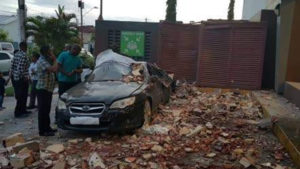 The Seismic Research Centre at the University of the West Indies (UWI) St Augustine campus in Trinidad measured the quake at 6.8, but the United States Geological Survey (USGS) put it at 7.3 and said it had a depth of 76 miles (123 kilometres). Its epicentre was 12 miles (20 kilometres) off the sparsely populated Cariaco peninsula that has seen several devastating quakes in the past.
The Seismic Research Centre at the University of the West Indies (UWI) St Augustine campus in Trinidad measured the quake at 6.8, but the United States Geological Survey (USGS) put it at 7.3 and said it had a depth of 76 miles (123 kilometres). Its epicentre was 12 miles (20 kilometres) off the sparsely populated Cariaco peninsula that has seen several devastating quakes in the past.
The quake, which occurred around 5:31 pm, was centred near the Venezuelan town of Guiria, and was felt in the capital, Caracas, and beyond Venezuela’s shores.
It also shook several Caribbean countries, including Guyana, Barbados, Trinidad and Tobago, Grenada, and St Vincent and the Grenadines.
In Trinidad and Tobago, where electricity poles fell and people ran into the streets screaming, Joan Latchman, a seismologist with The UWI Seismic Research Centre, said it was the strongest earthquake felt in Trinidad since December 2016.
She said there were seven aftershocks within an hour of the quake, and that more were expected.
Communications and National Security Minister Stuart Young, in an address to the nation, said that there was no need to panic.
He said the Office of Disaster Preparedness and Management had been in contact with the Tsunami Centre in the Pacific and a tsunami watch and warning had been called off.
He said while some areas of the island had been without electricity as a result of the quake, the Trinidad and Tobago Electricity Company was already in the field seeking to restore the service.
Young said that the police were also out on the streets and “I am happy to report, despite a few reports of cracks, some damage to buildings… the Ministry of Works and Transport has engineers out and are checking all of the major bridges in Trinidad and Tobago”.
He said the National Gas Company and two other local gas companies, which have a number of pipelines both on and offshore, have reported that all their infrastructure has been certified as being structurally safe “and right now we continue to monitor the situation”.
“We are happy to report at this stage there are no reports of anyone being severely injured. We have also been in contact with the various hospitals, health centres… everything appears to be intact and we have no reports of any serious infrastructural damage,” Young said.
Young said the country should be prepared for aftershocks and urged the population to be careful.
In Grenada, the National Disaster Management Agency (NaDMA) said that the country and its dependencies were not under any tsunami watch or warning.
“The motoring public and homeowners are advised to exercise caution as the shaking could have destabilised rocks and/or boulders around your home or along roadways. Vigilance is therefore encouraged by all,” the NaDMA said, adding that it had not received any information of damage caused by the quake, which it said “was the strongest felt on island”.
In Venezuela, a witness in Cumana, the biggest city near the epicentre, said there were initial reports of several injuries at a shopping centre where an escalator fell, but there were no other immediate signs of damage in the vicinity.
In downtown Caracas, concrete from the unfinished Tower of David office building fell to the sidewalk, creating a hazard.
John Boquett, a firefighter captain in Caracas, said there were no initial reports of injuries or major damage in the capital.
The quake was felt as far away as Colombia’s capital of Bogota, where authorities briefly closed the international airport to inspect for runway damage. In Caracas, office workers and residents fled their buildings and homes.
The confusing moments after the quake were captured on state television as Diosdado Cabello, the head of the all-powerful constitutional assembly, was delivering a speech at a march in support of the socialist Government’s recent package of reforms to rescue an economy beset by hyperinflation and widespread shortages.
“Quake!” people yelled as Cabello and others looked from side to side with a mixture of laughter and concern. “It’s the Bolivarian revolution speaking to the world,” Cabello thundered to applause.
A similar-sized quake in the same area left dozens dead in 1997.
Interior Minister Nestor Reverol said that disaster relief teams had been activated but so far there were no reports of fatalities.
“We ask for the greatest patience and tranquillity from the Venezuelan people,” he said in a televised address. “These situations require prudence.”
